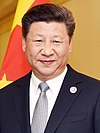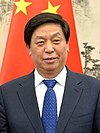
The State Council of the People's Republic of China, also known as the Central People's Government, is the chief administrative authority and the national cabinet of China. It is constitutionally the highest administrative organ of the country and the executive organ of the National People's Congress, the highest organ of state power. It is composed of the premier, vice premiers, state councilors, ministers of ministries, directors of committees, the auditor general, and the secretary-general.

The premier of China, officially titled the premier of the State Council of the People's Republic of China, is the head of government of China and leader of the State Council. This post was established in 1911 near the end of the Qing dynasty, but the current post dates to 1954, five years after the establishment of the PRC. The premier is the second-highest ranking person in China's political system after the general secretary of the Chinese Communist Party /president, and holds the highest rank in the civil service of the central government.

The Standing Committee of the National People's Congress (NPCSC) is the permanent body of the National People's Congress (NPC), the national legislature of the People's Republic of China. It exercises the powers of the NPC when it is not in session.
The orders of precedence in China is the ranking of political leaders in China for the purposes of event protocol and to arrange the ordering of names in official news bulletins, both written and televised. It is also sometimes used to assess perceived level of political power. Although there is no formally published ranking, there is usually an established convention and protocol, and the relative positions of Chinese political figures can usually be deduced from the order in meetings and especially by the time and order in which figures are covered by the official media. Since 1982, the General Secretary of the Chinese Communist Party has been the highest-ranking official in the People's Republic of China (PRC).

The 9th National People's Congress (NPC) was in session from 1998 to 2003 across five plenary sessions. It followed the final session of the 8th National People's Congress. There were 2,979 deputies to this Congress.

The 6th National People's Congress (NPC) was in session from 1983 to 1988. It held five sessions in this period.
The 2nd Session of the 11th National People's Congress was the annual meeting of the highest legislative body of the People's Republic of China, which was held in March 2009 at the Great Hall of the People in Beijing. The event began on March 5 and lasted until March 13. The Congress was followed closely because of the possible impact any policy changes would have on the Chinese and world economy. Major issues discussed at the Congress include the 2007–2008 financial crisis, economy of China, curbing unemployment, and social welfare.

The chairman of the Standing Committee of the National People's Congress is the presiding officer of the Standing Committee of the National People's Congress (NPCSC), which is the permanent body of the National People's Congress (NPC), the national legislature of China.

A state councillor is a high-ranking position within the State Council, the executive organ of the Chinese government. It ranks immediately below the vice premiers and above the ministers of various departments. Similar to minister without portfolio, the position carries duties unspecified at the time of appointment, although state councillor may also be appointed to head a department.
The 3rd Session of the 11th National People's Congress held its annual meeting in March 2010 at the Great Hall of the People in Beijing, China. The event opened on March 5, 2010 and concluded on March 14, 2010.

The National People's Congress (NPC) is the highest organ of state power of the People's Republic of China. The NPC is the only branch of government in China, and per the principle of unified power, all state organs from the State Council to the Supreme People's Court (SPC) are subservient to it. With 2,977 members in 2023, it is the largest legislative body in the world. The NPC is elected for a term of five years. It holds annual sessions every spring, usually lasting from 10 to 14 days, in the Great Hall of the People on the west side of Tiananmen Square in Beijing.
The 2014 National People's Congress held its annual meeting in March 2014 at the Great Hall of the People in Beijing, China. The session opened on 5 March and concluded on 13 March.

The president of China, officially titled the president of the People's Republic of China, is the state representative of the People's Republic of China. On its own, it is a ceremonial office and has no real power in China's political system. While the office has many of the characteristics of a head of state, the Chinese constitution does not define it as such. However, since 1993, the post has been held by the general secretary of the Chinese Communist Party (CCP) and chairman of the Central Military Commission, who is China's de facto leader.

The 13th National People's Congress (NPC) was elected from October 2017 to February 2018 and was in session in the five-year period from 2018 to 2023. It held five sessions in this period, occurring around early March every year until before 2023, when the 14th National People's Congress first convened.

The 2018 National People's Congress, or the First Session of the 13th National People's Congress, was held in March 2018 at the Great Hall of the People in Beijing, China. The session opened on 5 March and concluded on 20 March. Major state positions were elected in this session.
The 2020 National People's Congress was the Third Plenary Session of the 13th National People's Congress. It was held from Friday 22 to 28 May, concurrently with the Chinese People's Political Consultative Conference (CPPCC) as part of the annual Two Sessions. It was originally scheduled to be held in March 2020 at the Great Hall of the People in Beijing, China, however due to the global COVID-19 pandemic, it had been delayed until May.
The 2017 National People's Congress, or the Fifth Plenary Session of the 12th National People's Congress, was held in March 2017 at the Great Hall of the People in Beijing, China. It was the last plenary session of the 12th NPC held before elections the next year for the 13th National People's Congress.
The 2021 National People's Congress (NPC) was the Fourth Plenary Session of the 13th National People's Congress of the People's Republic of China (PRC). It was held from 5 March to 11 March 2021, concurrently with the Chinese People's Political Consultative Conference (CPPCC) as part of the annual Two Sessions. The NPC was held at the Great Hall of the People in Beijing.
The 2023 National People's Congress, officially the First Session of the 14th National People's Congress, was held in March 2023 at the Great Hall of the People in Beijing, China. The session opened on 5 March and concluded on 13 March. Major state positions of China were elected in this session.
The 2024 National People's Congress (NPC) was the Second Plenary Session of the 14th National People's Congress of the People's Republic of China (PRC). It was held from 5 March to 11 March 2024, concurrently with the Chinese People's Political Consultative Conference (CPPCC) as part of the annual Two Sessions. The NPC was held at the Great Hall of the People in Beijing.





